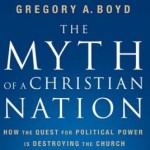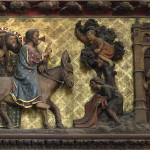We run our website the way we wished the whole internet worked: we provide high quality original content with no ads. We are funded solely by your direct support. Please consider supporting this project.

A Brief History of Political Power and the Church
The history of the church has been largely one of believers refusing to trust the way of the crucified Jesus and instead giving in to the very temptation he resisted. It’s the history of an institution that has frequently traded its holy and distinct mission for what it thought was a good mission. It is the history of an organization that has frequently forsaken the slow, discrete, nonviolent, sacrificial way of transforming the world for the immediate, obvious, practical, and less costly way of improving the world. It is a history of a people who have too often identified the kingdom of God with a “Christian” version of the kingdom of the world.
For the first 300 years, this wasn’t so. Followers of Jesus during this time saw themselves as “resident aliens.” They were a persecuted minority and as such did not dream of corporately exercising power in order to control political systems. Indeed, the church of this time grew not by Christians fighting for their rights, as so many do today, but largely by Christians being put to death. It was during this time that the word martyr, which originally meant “witness,” came to mean “one who dies for their faith,” for dying was one of the primary ways these early Christians witnessed for their faith.
It’s difficult to overemphasize the change that occurred when, in AD 312, the emperor Constantine was converted. Just prior to an important battle, legend has it that Constantine had a vision in which he was told to paint Chi Rho (the first two letters of the Greek word for “Christ”) on the shields of his soldiers. Allegedly, a voice in the vision announced, “By this sign you shall conquer.”
Constantine obeyed the vision and won the battle. The magic apparently worked, and so Constantine and his administration dedicated themselves to the Christians’ God. This was the first time anyone ever associated the Christian faith with violence, but its success stained the church from then on.
Constantine legalized Christianity in AD 313, and because of its association with him, the religion immediately exploded in popularity. Within seventy years it was proclaimed the official religion of the Roman Empire. The first recorded instance of Christians killing pagans occurred shortly after. In short order, the militant church extended its power by conquering lands and peoples throughout Europe, compelling them to become baptized Christians or die.
The cross-centered kingdom became a violent kingdom that embraced the sword. The church had become “the church militant and triumphant,” and the kingdom of God, manifested in the crucified Jesus, had become the empire of Christendom.
The sacrificial love and humility that characterized Christ and the early church had to be reinterpreted at this time to accommodate the new power that the church leaders believed God had given to the church. The lifestyle of Jesus and the early church came to be understood as a provisional inconvenience that had to be tolerated until Christianity could gain status in the world. Jesus and the early disciples had to be humbled and suffer, it was argued, because they didn’t have the power to do otherwise.
They argued that since the church knows the truth and thus knows what is best for all people it would be positively immoral to lay this power aside. Rather, the church used its newfound power to compel (by force) heathens and heretics to agree with it and be saved.
For the sake of the kingdom of God, we must rethink all of this. We must once again proclaim with our lives, and with our words when necessary, that the sole criteria for whether something is a manifestation of the kingdom of God or not is the person of Jesus Christ. Kingdom people need to lead the charge in proclaiming that the church has nothing to do with the kingdom of God whenever it wields the sword instead of loving. Only to the extent that the church looks like Jesus, dying for those who crucified him and praying for their forgiveness—to that degree can the people of God be said to manifest the kingdom of God.
—Adapted from The Myth of a Christian Nation, pages 75-82
Photo credit: johnpaulsimpson via Visual hunt / CC BY-ND
Category: General
Tags: Church, Constantine, Political Idolatry, Politics, Power
Related Reading

The Kingdom Stance Toward Enemies
Jesus was praying in the garden of Gethsemane, when a group of temple guards showed up to arrest him. Peter immediately drew his sword and started swinging it, cutting off a guard’s ear. From the world’s point of view, this violence was justified. Peter was simply defending himself and his master. Yet Jesus rebuked him,…

William Wilberforce and the Possibility of “Christian” Politics
William Wilberforce was a passionate Christian who entered politics for the sole purpose of ending the slave trade. For more than thirty years he passionately and courageous labored to get Parliament to outlaw the practice. His life’s dream was fulfilled a month before he died in 1833. It’s no surprise, therefore, that Wilberforce is frequently…

“For many…the American flag has smothered the glory of the cross, and the ugliness of our American version of Caesar has squelched the radiant love of Christ.” [Quotes]
“This myth harms the church’s primary mission. For many in America and around the world, the American flag has smothered the glory of the cross, and the ugliness of our American version of Caesar has squelched the radiant love of Christ. Because the myth that America is a Christian nation has led many to associate America…

Bowing to the American Flag. Literally.
Kurt Willems shared this interesting item he found on Amazon. In the product description it admonishes us to: Submit yourself to the Prayer Bench and open up your life to receive more of God. Hmmmmmm. How about we just submit ourselves to God?

Election Day Communion Resources
Rachel Held Evans posted today about Election Day Communion and provided resources for those of you who cannot attend one of these services. Let’s all be praying today for unity among the saints and blessings of peace regardless of the outcome of this election.

Palm Sunday, Partisan Politics & the Power of the Cross
Today we’re sharing something from David D. Flowers that we found especially insightful as we approach holy week. We hope it blesses you and moves you to more fully manifest the kingdom that is not of this world. ~~~ We remember it in the church as Palm Sunday. This is the triumphal entry of Jesus into…
